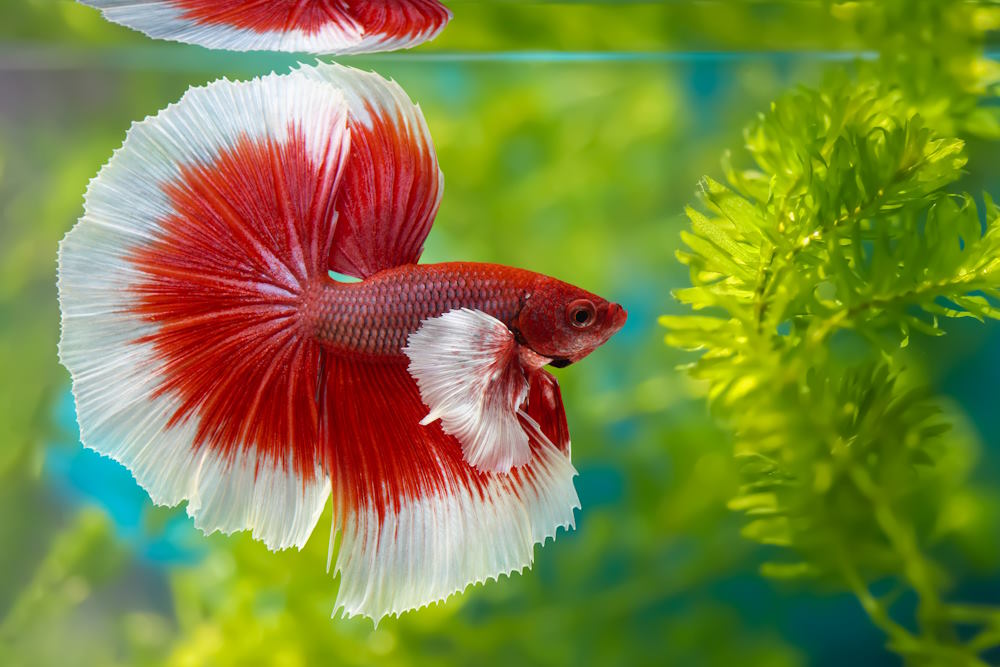The Ultimate Overview to Betta Fish Treatment: Vital Tips for Keeping a Healthy And Balanced and Successful Aquarium Environment
Reliable Betta fish care requires a detailed understanding of their unique ecological and physical needs. Establishing a suitable aquarium begins with picking the right container size and ensuring ideal water problems, which are important for the wellness and health of your Betta. Moreover, comprehending appropriate feeding techniques and developing a favorable environment can dramatically affect your fish's vitality and habits. As you take into consideration these fundamental elements, it becomes clear that preserving a prospering aquarium environment needs focus to information and recurring dedication. What certain strategies will you implement to enhance your Betta's lifestyle?
Choosing the Right Storage Tank
Choosing the proper container for your Betta fish is essential to guaranteeing its wellness and well-being. Bettas flourish in atmospheres that mimic their natural habitats, which generally contain calmness, warm waters. A storage tank dimension of at least 5 gallons is recommended to supply adequate swimming area, as smaller sized containers can bring about tension and health problems for these vivid fish.
When choosing a tank, think about the container's shape and filtering system. Additionally, a trusted filtration system is crucial to maintain water high quality and decrease the frequency of water modifications.
Temperature level law is another vital element; Bettas like water temperature levels in between 76 ° F and 82 ° F. Spending in a great heater will certainly make certain that the water continues to be within this range, advertising a healthy and active way of living for your Betta. Last but not least, providing appropriate tank decors and hiding spots will certainly help in reducing stress and anxiety and encourage natural behaviors, additionally boosting your Betta's wellness.
Maintaining Water Top Quality
Maintaining optimum water quality is important for the health and wellness and longevity of Betta fish. This requires routine surveillance of different specifications, consisting of temperature, pH, ammonia, nitrite, and nitrate levels. Bettas prosper in temperature levels between 76 ° F and 82 ° F, so preserving a steady temperature level is important. Unexpected fluctuations can lead to anxiety and health problem.
Normal screening using a trusted water testing set can assist ensure these criteria stay within the ideal arrays. Ammonia and nitrite degrees must always be at 0 ppm, as also low concentrations can be hazardous to Betta fish.
Routine water modifications are essential to keeping water top quality. It is advised to transform 25-50% of the container water weekly, depending on the container dimension and equipping degrees. Utilizing a premium water conditioner can help remove unsafe chemicals from tap water, guaranteeing a secure setting. In addition, integrating a durable filtering system can assist in preserving water clarity and quality, supplying a healthier environment for your Betta fish.
Perfect Feeding Practices
Offering a balanced diet is essential for the health and wellness and lively coloration of Betta fish, as their dietary needs play a considerable function in their general health. Betta fish are carnivorous naturally, requiring a diet plan high in protein. A combination of high-grade pellets, frozen or live foods such as bloodworms, salt water shrimp, and daphnia can offer the crucial nutrients they need.
Feed your Betta fish 2 to three times a day, providing just what they can eat within 2 to 3 mins to avoid overfeeding and keep water top quality. Overfeeding can result in obesity and health issues, including swim bladder condition. It is important to check their nutritional intake and change section dimensions accordingly.
Along with protein, a well balanced diet plan must include nutrients to promote optimum wellness. Think about supplementing their diet with high-quality flakes or pellets particularly created for Betta fish, as these usually visit site include needed additives.

Producing a Suitable Environment

Water top quality is critical; keep a temperature level in between 76 ° F and 82 ° F, and make sure the pH level ranges from 6 - betta fish.5 to 7.5. Regular water modifications of 25-50% weekly will help keep toxins away and guarantee a stable setting
Including plants and hiding places is essential, as Betta fish are naturally territorial and delight in having areas to explore and retreat. Live or silk plants, in addition to caves and accessories, can produce a stimulating environment.

Normal Wellness Checkups
Conducting normal health and wellness check-ups is crucial for guaranteeing the well-being of Betta i loved this fish, as early detection of prospective concerns can protect against serious health issue. These check-ups need to encompass a comprehensive examination of the fish's physical condition, actions, and environmental aspects.
Begin by observing the Betta fish for any indicators of distress, such as sleepiness, anorexia nervosa, or uncommon swimming patterns. In addition, inspect the fins and body for indicators of discoloration, lesions, or fin rot, which can indicate infections or bloodsuckers. On a regular basis checking the water top quality in the fish tank is similarly crucial; criteria such as pH, ammonia, nitrite, and nitrate levels should be maintained within ideal ranges to prevent stress and anxiety and health problem.
In addition, consider maintaining a log of health monitorings and water high quality examinations. This record can facilitate the identification of patterns or persisting problems. If any problems are discovered throughout the checkup, it is necessary to get in touch with a veterinarian experienced in water animals. Timely intervention can make a considerable distinction in the recuperation of your Betta fish, making sure a long and healthy and balanced life in a well-maintained fish tank setting.
Conclusion
To conclude, successful Betta fish treatment rests on developing and maintaining an optimal fish tank setting. Key elements include selecting an appropriately sized tank, making sure consistent water top quality, adhering to optimal feeding practices, and making a habitat that decreases tension. Normal wellness examinations are necessary for very early detection of possible problems. By adhering to these guidelines, aquarists can promote the well-being and vibrancy of Betta fish, eventually leading to a flourishing water ecosystem.